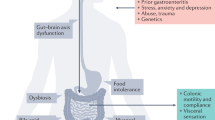Abstract
Diverticular disease is traditionally understood as an environmental disease caused by diet and constipation. However, genes are increasing understood to play a role in pathogenesis. Twin studies suggest a substantial component of individual risk is due to heritable factors. Association of diverticular disease with other traits suggests an underlying biological mechanism and recently genome-wide association studies have described the genetic architecture underlying this complex phenotype. These studies suggest a new paradigm for understanding this common surgical disease.
Similar content being viewed by others
References
Peery AF, Crockett SD, Murphy CC, et al. Burden and Cost of Gastrointestinal, Liver, and Pancreatic Diseases in the United States: Update 2018. Gastroenterology. 2019;156(1):254–272.e11. doi:https://doi.org/10.1053/j.gastro.2018.08.063
Peery AF, Keku TO, Martin CF, et al. Distribution and Characteristics of Colonic Diverticula in a United States Screening Population. Clin Gastroenterol Hepatol. 2016;14(7):980–985.e1. doi:https://doi.org/10.1016/j.cgh.2016.01.020
Spriggs EI, Marxer OA. An Address on Intestinal Diverticula. Br Med J. 1926;1(3395):130–134. doi:https://doi.org/10.1136/bmj.1.3395.130
Bharucha AE, Parthasarathy G, Ditah I, et al. Temporal trends in the incidence and natural history of diverticulitis: A population-based study. Am J Gastroenterol. 2015;110(11):1589–1596. doi:https://doi.org/10.1038/ajg.2015.302
Adler JT, Chang DC, Chan AT, Faiz O, Maguire LH. Seasonal Variation in Diverticulitis: Evidence from Both Hemispheres. Dis Colon Rectum. 2016;59(9):870–877. doi:https://doi.org/10.1097/DCR.0000000000000657
Liu PH, Cao Y, Keeley BR, et al. Adherence to a Healthy Lifestyle is Associated With a Lower Risk of Diverticulitis among Men. Am J Gastroenterol. 2017;112(12):1868–1876. doi:https://doi.org/10.1038/ajg.2017.398
Strate LL, Liu YL, Aldoori WH, Giovannucci EL. Physical activity decreases diverticular complications. Am J Gastroenterol. 2009;104(5):1221–1230. doi:https://doi.org/10.1038/ajg.2009.121
Ma W, Jovani M, Liu PH, et al. Association Between Obesity and Weight Change and Risk of Diverticulitis in Women. Gastroenterology. 2018;155(1):58–66.e4. doi:https://doi.org/10.1053/j.gastro.2018.03.057
Painter NS, Burkitt DP. Diverticular Disease of the Colon: A Deficiency Disease of Western Civilization. Br Med J. 1971;2(5759):450–454. doi:https://doi.org/10.1136/bmj.2.5759.450
O’Keefe SJ. The association between dietary fiber deficiency and high-income lifestyle-associated diseases: Burkitt’s hypothesis revisited. Lancet Gastroenterol Hepatol. 2019;4(12):984–996. doi:https://doi.org/10.1016/S2468-1253(19)30257-2
Ma W, Nguyen LH, Song M, et al. Intake of Dietary Fiber, Fruits, and Vegetables and Risk of Diverticulitis. Am J Gastroenterol. 2019;114(9):1531–1538. doi:https://doi.org/10.14309/ajg.0000000000000363
Vally M, Koto MZ, Govender M. An investigation of diverticular disease among black patients undergoing colonoscopy at dr george mukhari academic hospital, Pretoria, South Africa. South African Med J. 2017;107(2):137–139. doi:https://doi.org/10.7196/SAMJ.2017.v107i2.12007
Akere A, Oke TO, Otegbayo JA. Colonoscopy at a tertiary healthcare facility in Southwest Nigeria: Spectrum of indications and colonic abnormalities. Ann Afr Med. 2016;15(3):109–113. doi:https://doi.org/10.4103/1596-3519.188889
Alatise OI, Arigbabu AO, Lawal OO, Adetiloye VA, Agbakwuru EA, Ndububa DA. Presentation, distribution pattern, and management of diverticular disease in a Nigerian tertiary hospital. Niger J Clin Pract. 2013;16(2):226–231. doi:https://doi.org/10.4103/1119-3077.110152
Hong W, Geng W, Wang C, et al. Prevalence of colonic diverticulosis in mainland China from 2004 to 2014. Sci Rep. 2016;6. doi:https://doi.org/10.1038/srep26237
Bae HJ, Kim ST, Hong SG, et al. Risk Factors for Asymptomatic Colon Diverticulosis. Korean J Gastroenterol. 2019;74(3):142–148. doi:https://doi.org/10.4166/kjg.2019.74.3.142
Wang FW, Chuang HY, Tu MS, et al. Prevalence and risk factors of asymptomatic colorectal diverticulosis in Taiwan. BMC Gastroenterol. 2015;15(1). doi:https://doi.org/10.1186/s12876-015-0267-5
Broad JB, Wu Z, Clark TG, et al. Diverticulosis and nine connective tissue disorders: epidemiological support for an association. Connect Tissue Res. 2019;60(4):389–398. doi:https://doi.org/10.1080/03008207.2019.1570169
Santin BJ, Prasad V, Caniano DA. Colonic diverticulitis in adolescents: An index case and associated syndromes. Pediatr Surg Int. 2009;25(10):901–905. doi:https://doi.org/10.1007/s00383-009-2472-1
Martens M. Developmental and cognitive troubles in Williams syndrome. In: Handbook of Clinical Neurology. Vol 111. Elsevier B.V.; 2013:291–293. doi:https://doi.org/10.1016/B978-0-444-52,891-9.00033-6
Identification of a rare LAMB4 variant associated with familial diverticulitis through exome sequencing. - PubMed - NCBI. Accessed May 18, 2020. https://www.ncbi.nlm.nih.gov/pubmed/28595269
Connelly TM, Berg AS, Hegarty JP, et al. The TNFSF15 gene single nucleotide polymorphism rs7848647 is associated with surgical diverticulitis. Ann Surg. 2014;259(6):1132–1137. doi:https://doi.org/10.1097/SLA.0000000000000232
Almalki T, Garfinkle R, Kmiotek E, et al. Family History is Associated with Recurrent Diverticulitis After an Episode of Diverticulitis Managed Nonoperatively. Dis Colon Rectum. Published online March 2020:1. doi:https://doi.org/10.1097/dcr.0000000000001656
Strate LL, Erichsen R, Baron JA, et al. Heritability and familial aggregation of diverticular disease: A population-based study of twins and siblings. Gastroenterology. 2013;144(4). doi:https://doi.org/10.1053/j.gastro.2012.12.030
Granlund J, Svensson T, Olén O, et al. The genetic influence on diverticular disease - A twin study. Aliment Pharmacol Ther. 2012;35(9):1103–1107. doi:https://doi.org/10.1111/j.1365-2036.2012.05069.x
Sigurdsson S, Alexandersson KF, Sulem P, et al. Sequence variants in ARHGAP15, COLQ and FAM155A associate with diverticular disease and diverticulitis. Nat Commun. 2017;8. doi:https://doi.org/10.1038/ncomms15789
Maguire LH, Handelman SK, Du X, Chen Y, Pers TH, Speliotes EK. Genome-wide association analyses identify 39 new susceptibility loci for diverticular disease. Nat Genet. 2018;50(10):1359–1365. doi:https://doi.org/10.1038/s41588-018-0203-z
Costa C, Germena G, Martin-Conte EL, et al. The RacGAP ArhGAP15 is a master negative regulator of neutrophil functions. Blood. 2011;118(4):1099–1108. doi:https://doi.org/10.1182/blood-2010-12-324,756
Malysz J, Gibbons SJ, Saravanaperumal SA, et al. Conditional genetic deletion of Ano1 in interstitial cells of cajal impairs Ca2+ transients and slow waves in adult mouse small intestine. Am J Physiol - Gastrointest Liver Physiol. 2017;312(3):G228-G245. doi:https://doi.org/10.1152/ajpgi.00363.2016
Golder M, Burleigh DE, Ghali L, et al. Longitudinal muscle shows abnormal relaxation responses to nitric oxide and contains altered levels of NOS1 and elastin in uncomplicated diverticular disease. Color Dis. 2007;9(3):218–228. doi:https://doi.org/10.1111/j.1463-1318.2006.01160.x
Heinz-Erian P, Müller T, Krabichler B, et al. Mutations in SPINT2 cause a syndromic form of congenital sodium diarrhea. Am J Hum Genet. 2008;84(2):188–196. doi:https://doi.org/10.1016/j.ajhg.2009.01.004
Schafmayer C, Harrison JW, Buch S, et al. Genome-wide association analysis of diverticular disease points towards neuromuscular, connective tissue and epithelial pathomechanisms. Gut. 2019;68(5):854–865. doi:https://doi.org/10.1136/gutjnl-2018-317,619
Torkamani A, Wineinger NE, Topol EJ. The personal and clinical utility of polygenic risk scores. Nat Rev Genet. 2018;19(9):581–590. doi:https://doi.org/10.1038/s41576-018-0018-x
Author information
Authors and Affiliations
Corresponding author
Additional information
Publisher’s Note
Springer Nature remains neutral with regard to jurisdictional claims in published maps and institutional affiliations.
Rights and permissions
About this article
Cite this article
Maguire, L.H. Genetic Risk Factors for Diverticular Disease—Emerging Evidence. J Gastrointest Surg 24, 2314–2317 (2020). https://doi.org/10.1007/s11605-020-04693-5
Received:
Accepted:
Published:
Issue Date:
DOI: https://doi.org/10.1007/s11605-020-04693-5




